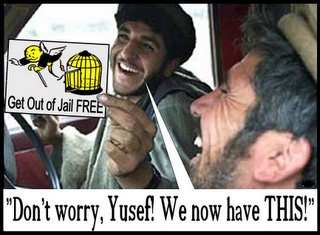Captured Terror Suspects May Go Free on Technicality
Lawyers Contemplate Civil Case Against President

In the latest twist of this exploding story, Terror suspects who were captured in the United States, with the help of a highly classified intelligence gathering program leaked to the New York Times, will now try to use this information to have their cases thrown out of court. In fact, their lawyers have indicated an interest in pursuing a subsequent civil complaint against President Bush.
The New York Times (that very same newspaper that knowingly reported classified National Security information), published an article entitled Defense Lawyers in Terror Cases Plan Challenges Over Spy Efforts.
The New York Times (that very same newspaper that knowingly reported classified National Security information), published an article entitled Defense Lawyers in Terror Cases Plan Challenges Over Spy Efforts.
"Defense lawyers in some of the country's biggest terrorism cases say they plan to bring legal challenges to determine whether the National Security Agency used illegal wiretaps against several dozen Muslim men tied to Al Qaeda."
This program invoked by the President,
- Is probably legal under the Constitution (see below)
- Has been approved by two Attorney Generals
- Was briefed to both Congressional Intelligence Oversight Committees over a dozen times
- Is based on a precedent of presidential powers that had been set by Bill Clinton
- Has thwarted at least two terrorist attacks against the U.S. and Britain - possibly dozens (still classified)
"...the government's strongest argument is that the NSA wiretaps were legal. While this isn't a settled issue of law, there's a strong argument that because of the president's constitutional authority in the area of foreign affairs, the president may authorize surveillance to obtain foreign intelligence information without obtaining a warrant. United States v. Truong (Fourth Circuit 1980), which was based on a pre-FISA set of facts, held that the president did have this power to conduct warrantless surveillance. Thereafter, in In re Sealed Case (2002), a special court convened to hear FISA appeals noted that Truong and all other courts to decide the issue "held that the President did have inherent authority to conduct warrantless searches to obtain foreign intelligence information." Further, In re Sealed Case stated, "We take for granted that the President does have that authority and, assuming that is so, FISA could not encroach on the President's constitutional power." This is a basic point of constitutional law: If a power is derived from the Constitution itself, that power cannot be abridged by statute."The liberal outrage decrying the supposed outing of "Covert Agent" Velerie Plame by administration officials, even if true, would be nothing next to this blatant sell-out of our National Security. How can there be such an uproar when the President has taken these measures to do his job? David Limbaugh in a Washington Times article, entitled Subordinating the truth, makes several suggestions to the MSM on what they should be investigating, to include:
"How Democratic Senators can complain about the government's failure to connect the dots concerning the terrorists' September 11, 2001, plot and yet take action that will virtually guarantee our inability to connect future dots."How are we to wage the War on Terror without using our resources? We are slowly tying our hands in every facet of this fight - from regulating and publicizing our interrogation methods to curbing our own ability to use force - in this wacky, bizzaro-world of protecting the guilty and imperiling the innocent, there is a very real possibility that our nation will meet its ultimate doom by such madness (try to imagine 9-11 times TEN).
And the New York Times, no doubt, hopes to be there at the end to get the scoop on its own handiwork.
























<< Home